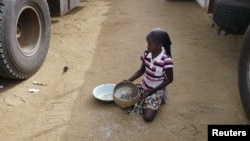GENEVA -- U.N. Children's Fund officials are reporting that violence against children in northern Mali is mounting and that they are gravely concerned about the growing number of children being killed, injured and grossly abused as a consequence of the fighting between Tuareg separatists, Islamist militants, and government forces.
UNICEF says more than 330,000 people have become internally displaced or fled to neighboring countries in search of refuge, and that children comprise one-fifth of this population, which they describe as the war's greatest and most vulnerable group of victims.
According to UNICEF spokeswoman Marixie Mercado, children are being killed or injured by explosive devices, and all armed groups are recruiting children as soldiers. She also cites reports of rape and sexual abuse.
"The evidence gathered since the end of March shows that at least 175 boys ages 12 to 18 have been recruited into armed groups, at least eight girls raped or sexually abused, and two boys aged 14 and 15 were killed in separate incidents related to unexploded ordnance, and 18 children were maimed," she said.
UNICEF says most schools in northern Mali are closed, affecting up to 300,000 children, noting that out-of-school youth are at increased risk of recruitment, violence and exploitation.
Mercado says international humanitarian workers have only limited access to the region, so the agency lacks a complete picture of the scope of risks children are facing, and that the true number of children affected by violence and abuse is probably larger than current figures indicate.
While UNICEF is working with local aid agencies in conflict-affected regions of Kidal, Gao and Timbuktu to help communities strengthen their ability to protect children from the growing dangers, unrest in northern Mali is coinciding with a severe nutritional crisis across much of West Africa's Sahel region, which is also having a profound negative effect on children.
"Some 560,000 young children in Mali are at risk of acute malnutrition this year, including between 175,000 and 220,000 who require life-saving treatment," said Mercado. "The vast majority of malnourished children in Mali live in the southern parts of the country, but conditions in the north have sharply reduced access to food, water and basic health care."
Mercado says UNICEF is providing health, nutrition, water and sanitation and other emergency supplies to its partners in Gao, Timbuktu and Kidal, and are doing their best to reach children with life-saving vaccines, nutritional supplements and de-worming medication.
Since the beginning of the year, UNICEF has treated more than 70,000 children throughout Mali for acute malnutrition. The agency says its humanitarian operation is also in a critical state as it has received only 20 percent of the $58 million it needs for Mali this year.
UNICEF says more than 330,000 people have become internally displaced or fled to neighboring countries in search of refuge, and that children comprise one-fifth of this population, which they describe as the war's greatest and most vulnerable group of victims.
According to UNICEF spokeswoman Marixie Mercado, children are being killed or injured by explosive devices, and all armed groups are recruiting children as soldiers. She also cites reports of rape and sexual abuse.
"The evidence gathered since the end of March shows that at least 175 boys ages 12 to 18 have been recruited into armed groups, at least eight girls raped or sexually abused, and two boys aged 14 and 15 were killed in separate incidents related to unexploded ordnance, and 18 children were maimed," she said.
UNICEF says most schools in northern Mali are closed, affecting up to 300,000 children, noting that out-of-school youth are at increased risk of recruitment, violence and exploitation.
Mercado says international humanitarian workers have only limited access to the region, so the agency lacks a complete picture of the scope of risks children are facing, and that the true number of children affected by violence and abuse is probably larger than current figures indicate.
While UNICEF is working with local aid agencies in conflict-affected regions of Kidal, Gao and Timbuktu to help communities strengthen their ability to protect children from the growing dangers, unrest in northern Mali is coinciding with a severe nutritional crisis across much of West Africa's Sahel region, which is also having a profound negative effect on children.
"Some 560,000 young children in Mali are at risk of acute malnutrition this year, including between 175,000 and 220,000 who require life-saving treatment," said Mercado. "The vast majority of malnourished children in Mali live in the southern parts of the country, but conditions in the north have sharply reduced access to food, water and basic health care."
Mercado says UNICEF is providing health, nutrition, water and sanitation and other emergency supplies to its partners in Gao, Timbuktu and Kidal, and are doing their best to reach children with life-saving vaccines, nutritional supplements and de-worming medication.
Since the beginning of the year, UNICEF has treated more than 70,000 children throughout Mali for acute malnutrition. The agency says its humanitarian operation is also in a critical state as it has received only 20 percent of the $58 million it needs for Mali this year.




